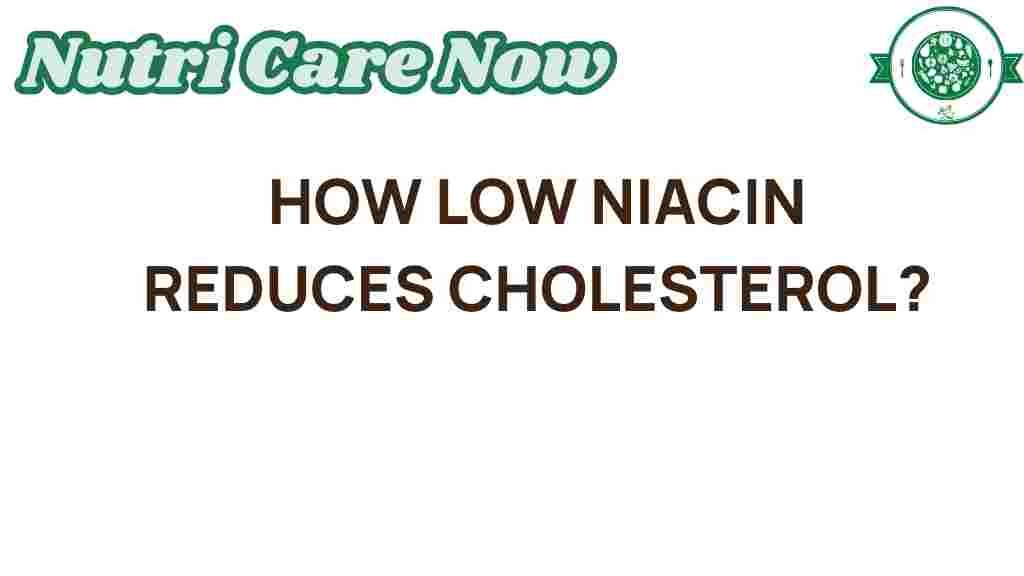Unraveling the Mystery: How Low Niacin Levels Impact Cholesterol
Cholesterol has long been a topic of concern in the realm of health and nutrition. While many people focus on reducing their cholesterol intake, they may overlook the role of essential nutrients such as niacin, also known as vitamin B3. In this article, we will explore how low niacin levels can impact cholesterol, lipid levels, and overall heart health, while also discussing ways to incorporate this vital nutrient into your diet.
Understanding Niacin and Its Role in Health
Niacin, or vitamin B3, is a water-soluble vitamin that plays a critical role in various bodily functions. It is essential for:
- Energy production
- DNA repair
- Cell signaling
- Fat metabolism
Moreover, niacin is known for its ability to support heart health by positively influencing cholesterol levels. This article will delve deeper into how niacin affects lipid levels and why maintaining adequate levels of this vitamin is crucial for your overall health.
The Relationship Between Niacin and Cholesterol
Cholesterol is often categorized into two main types: low-density lipoprotein (LDL) and high-density lipoprotein (HDL). While LDL is often referred to as “bad” cholesterol due to its association with heart disease, HDL is considered “good” cholesterol because it helps remove LDL from the bloodstream.
Niacin has been shown to:
- Increase HDL cholesterol levels
- Lower LDL cholesterol levels
- Reduce triglycerides
Research indicates that niacin can significantly reduce the risk of cardiovascular diseases by improving the lipid profile. However, many people do not get sufficient niacin through their diet, leading to potential health issues.
Symptoms of Niacin Deficiency
A deficiency in niacin can lead to several health problems, including:
- Pellagra, characterized by dermatitis, diarrhea, and dementia
- Fatigue
- Depression
- Memory loss
Recognizing these symptoms is essential, as they can impact overall health and wellbeing. If you suspect you might be experiencing a niacin deficiency, it is vital to consult with a healthcare professional.
How to Boost Niacin Levels Through Diet
Incorporating niacin-rich foods into your diet is a practical way to improve your niacin levels and, consequently, your cholesterol and heart health. Here are some foods high in niacin:
- Meat (beef, pork, turkey)
- Fish (tuna, salmon)
- Poultry (chicken, turkey)
- Legumes (peanuts, lentils)
- Seeds and nuts (sunflower seeds, almonds)
- Whole grains (brown rice, whole wheat bread)
By integrating these foods into your meals, you can naturally increase your niacin intake and support healthy cholesterol levels.
Consider Niacin Supplements
For individuals who find it challenging to obtain adequate niacin through diet alone, niacin supplements may be a beneficial option. Here’s a step-by-step guide to using niacin supplements:
Step 1: Consult Your Healthcare Provider
Before starting any supplement regimen, it’s crucial to discuss it with a healthcare provider. They can help assess your individual needs and recommend appropriate dosages.
Step 2: Choose the Right Form of Niacin
Niacin supplements come in various forms, including:
- Immediate-release niacin
- Sustained-release niacin
- Extended-release niacin
Your healthcare provider can help you choose the best form for your health goals.
Step 3: Monitor Your Health
As you begin taking niacin supplements, keep track of any changes in your cholesterol levels and overall health. Regular blood tests can help measure your lipid levels and assess the effectiveness of the supplement.
Potential Side Effects of Niacin
While niacin is generally safe, it can cause side effects, especially at high doses. Common side effects include:
- Flushing of the skin
- Itching
- Nausea
- Elevated liver enzymes
If you experience any adverse effects, consult your healthcare provider immediately.
Integrating Niacin into a Heart-Healthy Diet
In addition to focusing on niacin, it’s essential to adopt a comprehensive heart-healthy diet that includes:
- Fruits and vegetables
- Whole grains
- Healthy fats (avocado, olive oil)
- Lean proteins
By making these dietary choices, you can further enhance your heart health and improve your lipid levels.
Troubleshooting Low Niacin Levels
If you find that your niacin levels are still low despite dietary changes, consider the following troubleshooting tips:
- Evaluate Your Diet: Keep a food diary to identify if you’re consistently missing niacin-rich foods.
- Check for Underlying Conditions: Certain health issues can affect nutrient absorption. Speak to your doctor about possible conditions.
- Consider Fortified Foods: Some cereals and grains are fortified with niacin. Look for these options in your grocery store.
By addressing these factors, you can better manage your niacin levels and support your cholesterol health.
Conclusion
In summary, maintaining adequate niacin levels is critical for managing cholesterol and promoting heart health. Through a balanced diet rich in niacin and, if necessary, the use of supplements, individuals can take proactive steps to improve their lipid levels and overall wellbeing. Remember to consult with a healthcare professional before making significant changes to your diet or health regimen. Ensuring proper nutrition is key to leading a healthy life and safeguarding your heart.
For more information on heart health and nutrition, visit this resource and learn more about how you can improve your overall health.
This article is in the category Health and created by NutriCareNow Team
